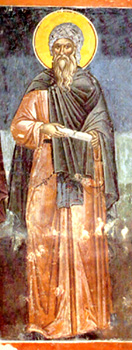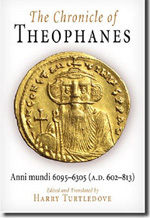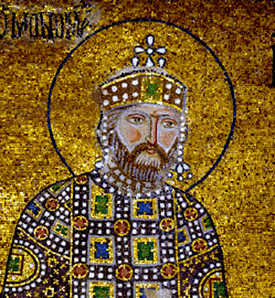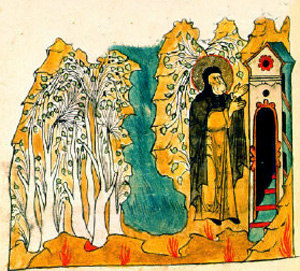 |
The Saint of the Day
St. Theophanes, March 12
Prof. Plinio Corrêa de Oliveira
Biographical selection:
Theophanes, born in Constantinople, belonged to one of the noblest families of the Byzantine Empire. His father died when he was three years old, and left him heir of a great estate, under the guardianship of the Emperor Constantine Copronymus, who raised the boy.

St. Theophanes, Abbot and Confessor
|
At the young age of 12, he was obliged to take a wife. But on the day of the marriage, they made a mutual vow of perpetual chastity. When his father-in-law learned of the agreement, he became angry because he wanted heirs to the enormous fortune of Theophanes. He complained to the Emperor, who sent Theophanes to Cyzicus, close to the Sea of Marmara, with the title of Royal Manager of Public Works in Helespont and Lysia.
There he met the monk who instructed him in the way of contemplation. Theophanes abandoned the world and retired to a monastery. Later he built two monasteries in Mysia, and became Abbot over the one called Megal-Agre.
In 814, Emperor Leo the Armenian renewed the persecution against the Holy Church, abolishing the use of holy images. This Emperor was aware of the great reputation and authority that Theophanes enjoyed among faithful Catholics. With the aim of winning him to his cause, he called Theophanes to Constantinople. The Saint realized the hook concealed under the alluring baits, but this did not hinder him from obeying the Emperor’s summons. Upon Theophanes’ arrival to the city, the Emperor sent him this message:
“From your mild and obliging disposition, I flatter myself you are come to confirm my opinion on the point in question [the destruction of images] with your support. This is the readiest way to obtain my favor, and, with that, the greatest riches and honors for yourself, your monastery, and your relations, as much as it is in the power of an Emperor to bestow.
“But if you refuse to comply with my desires in this affair, you will incur my highest displeasure, and draw misery and disgrace on yourself and your friends.”

The Saint left Chronicles covering the years 602-813
|
Theophanes, who was never intimidated by promises or threats, returned this answer:
“Being now far advanced in years and much broken with pains and infirmities, I have neither relish nor inclination for any of those things which, for Christ’s sake, I despised in my youth, when I was in a condition to enjoy the world. As for my monastery and my friends, I place their destiny in the hands of God.
“If you think to frighten me into compliance by your threats, as a child is awed by the whip, you only lose your time. For though I am without the strength to walk and subject to many other corporal infirmities, I trust Jesus Christ that, in defense of His cause, He will give me the strength and courage to suffer for His cause the sharpest torments you can inflict on my weak body.”
Enraged, the Emperor ordered Theophanes to be confined in a close, stinking dungeon, where the Saint remained for two years suffering from cruelties and sicknesses. He was also heartlessly scourged, one day receiving 300 blows of the whip.
In 818, he was exiled to Samothracia, where he died 17 days after his arrival, on March 12, 818.
Comments of Prof. Plinio:
It is a beautiful thing to see this generosity in a high dignitary of the imperial court of Constantinople.

Picture of a Byzantine Emperor
|
To create a picture of the ambience, as St. Ignatius advises us to do when we meditate, we have to imagine one of those solemn Basileus, the title of the Byzantine Emperor. He sits with his icon-like face and judicial air, his face framed with pearls, an ivory scepter in his hand, and his gaze turned toward the Bosphorus, contemplating, as it were, centuries of History. On the golden wall, above him, hangs a gold-plated picture of St. Michael the Archangel.
Emperor Copronymus brings this kind of picture to mind. This man raised Theophanes, who was a pure young man, a rare thing in our days. He married Theophanes to a pure young lady, also a rare thing today. Something even more rare, both decided to maintain perfect chastity in their married life.
When he learned this, the Emperor sent his protégé into a golden exile. He went with a pompous title – almost all the Byzantine titles are pompous – describing a mere administrative function. He probably lived in a palace, which would be a miniature of the imperial palace in Constantinople, where he would receive the people of the area with a proportionate pomp and ceremony. It would be normal for him to have a small throne where he would give his orders and resolve the problems of the region.
At times his interlocutors would be monks who would leave their monasteries or hermitages in the desert to come to the palace to address their needs with the imperial delegate.
Once, one of these monks invited him to go with him to the desert: “Theophanes, I see that you are a pure man. God calls you, however, to a greater purity. Leave, O Theophanes, the pleasures of the world and the delights promised to you. Come with me to the desert, where those who are loved by God, far from the world, enjoy familiarity with the Lord.” One can imagine such a scene.
And so, Theophanes left the world, went to the desert, and became the abbot of a monastery.

Theophanes responded to the summons to Constantinople, but refused to bend in Catholic doctrine
|
Regarding the letter of Leo the Armenian, we see the great fidelity of the Saint and the heroism of his resistance to the bad doctrine of the Emperor. Neither promises of rewards nor threats of punishment could move him from his decision to be faithful to Our Lord. We see that the promise made by our imaginary monk was fulfilled: Theophanes had acquired familiarity with the Lord, which cannot be traded for any human advantage.
What can be said about his sublime perseverance in his sufferings and death? We see the same purity of intention, never stained throughout his life: Purity of body, purity of soul. We can imagine the glory he received in Heaven when his soul was taken by the Angels to be brought before the Eternal Judge.
From Heaven he worked, I am sure of that, many miracles, to confirm Catholics in their fidelity to the Faith and in the resistance against the Iconoclast heresy.
In our admiration for St. Theophanes, let us address to him a prayer asking that he give us the purity of customs he had, as well the purity of purpose he maintained to his last breath of life, so that we can follow his example and resist the evil of our days, Progressivism in the Church and the Revolution in Christendom.


  | | Prof. Plinio Corrêa de Oliveira | |
The Saint of the Day features highlights from the lives of saints based on comments made by the late Prof. Plinio Corrêa de Oliveira. Following the example of St. John Bosco who used to make similar talks for the boys of his College, each evening it was Prof. Plinio’s custom to make a short commentary on the lives of the next day’s saint in a meeting for youth in order to encourage them in the practice of virtue and love for the Catholic Church. TIA thought that its readers could profit from these valuable commentaries.
The texts of both the biographical data and the comments come from personal notes taken by Atila S. Guimarães from 1964 to 1995. Given the fact that the source is a personal notebook, it is possible that at times the biographic notes transcribed here will not rigorously follow the original text read by Prof. Plinio. The commentaries have also been adapted and translated for TIA’s site.
|
Saint of the Day | Home | Books | CDs | Search | Contact Us | Donate

© 2002- Tradition in Action, Inc. All Rights Reserved
|
 |

|